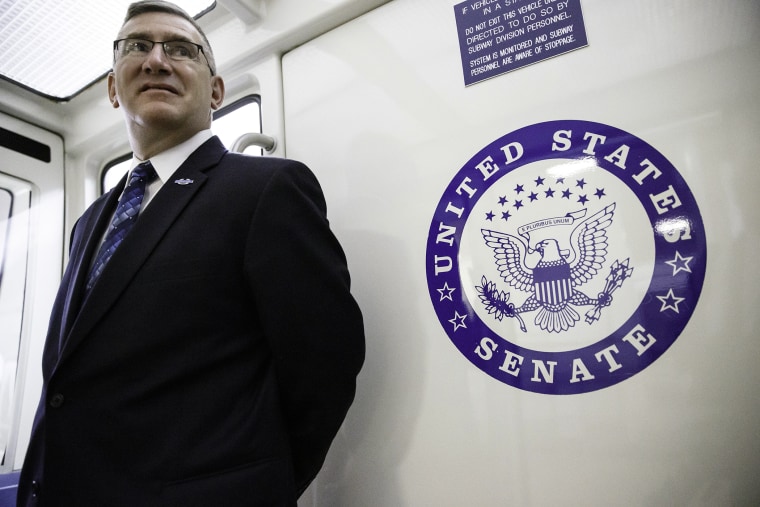Appointed Democratic Sen. John Walsh of Montana is running for a full term this year, and by all estimates, faces long odds. One recent analysis found the decorated Iraq war veteran stands about a 6% chance of success. Recent polling suggests Walsh has narrowed the gap against Rep. Steve Daines (R), but everyone agrees the senator has a tough road ahead.
A road that now looks even tougher, following this New York Times report.
On the campaign trail this year, Mr. Walsh, 53, has made his military service a main selling point. Still wearing his hair close-cropped, he notes he was targeted for killing by Iraqi militants and says his time in uniform informs his views on a range of issues. But one of the highest-profile credentials of Mr. Walsh's 33-year military career appears to have been improperly attained. An examination of the final paper required for Mr. Walsh's master's degree from the United States Army War College indicates the senator appropriated at least a quarter of his thesis on American Middle East policy from other authors' works, with no attribution.
The incident occurred seven years ago, before Walsh was serving in elected office, but it can't be dismissed as a youthful indiscretion -- he was 46 at the time. What's more, the extent of the plagiarism wasn't just the result of sloppy editing; large chunks of others' work was presented as his own.
Walsh acknowledged late yesterday that he made a "mistake," adding, "I don't want to blame my mistake on PTSD, but I do want to say it may have been a factor. My head was not in a place very conducive to a classroom and an academic environment."
Time will tell the degree to which Montana voters hold this against him, but it raises a larger question about why some politicians can overcome plagiarism controversies and some can't.
Yesterday afternoon, for example, the conventional wisdom surrounding the senator's future changed in a hurry -- Walsh went from "he's a clear underdog" to "he's a dead man walking."
But there was no similar reaction to Sen. Rand Paul's (R-Ky.) well-documented plagiarism, which was arguably more outrageous -- it happened while he was in office, not before, and Paul presented others' work as his own in a wide variety of media (speeches, op-eds, and books). Worse, when caught, the Kentucky Republican initially refused to acknowledge his mistake, came up with a variety of strange excuses, followed by an odd comment about duels.
But nearly a year later, the political world seems to have largely forgotten about the Kentucky Republican's controversy. Two senators have been caught plagiarizing: one is doomed, the other is preparing a presidential campaign.
Why is that? I imagine many will want to insert an IOKIYAR joke here, but that's probably not the best explanation. A guy by the name of Joe Biden was also caught up in a plagiarism flap, and it appears his career worked out quite well.
Rather, I think it has to do with available political capital. Rand Paul has a loyal following, is a well-known and popular figure in Kentucky, and is taken seriously by the Beltway media as an important national figure. The fact that he was caught repeatedly presenting others' work as his own was embarrassing, but not fatal -- Paul, whether he deserved it or not, had a reservoir of a capital that left him some room for error.
John Walsh, on the other hand, is seen as little more than an appointed Democratic senator from a red state who seemed likely to lose anyway. It's tough to defend this double standard as fair, but I think it helps explain the wildly divergent reactions.
Related video:
